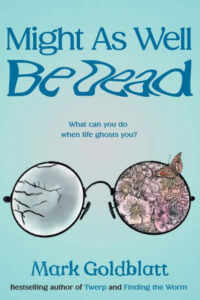 I am so pleased to feature guest writer Mark Goldblatt today on Book Club Babble. Mark’s newest book, Might as Well be Dead, features a 13-year-old protagonist, David Salmon, who starts seeing John Lennon’s ghost. David is 99% sure he isn’t real, but when the ghost helps him cope through family trauma and coming-of-age, David learns that he needs more than a little help from his friends.
I am so pleased to feature guest writer Mark Goldblatt today on Book Club Babble. Mark’s newest book, Might as Well be Dead, features a 13-year-old protagonist, David Salmon, who starts seeing John Lennon’s ghost. David is 99% sure he isn’t real, but when the ghost helps him cope through family trauma and coming-of-age, David learns that he needs more than a little help from his friends.
Today Mark talks about how his first novel made it into the world and evolved from there. His essay offers a sneak peek into publishing, the themes writers tackle through their writing, and what happens to their stories when they are out of our hands, so to speak. Welcome, Mark, and thank you!
When I began writing my 2013 middle grade novel Twerp, I had a clear idea of what I was trying to do: dramatize the exact moment in the life of a 12-year-old boy when his conscience kicks in, when he moves from the childish view that an action is wrong because he got caught to the mature realization that an action can be wrong in itself. Truth be told, I wasn’t even thinking about Twerp as a kids book. My previous novels had been written for adults, so I was thinking about this one as another adult novel… that happened to have a 12-year-old narrator.
As I continued working on the book, other themes emerged—at least in my mind. The healing power of confession. The socializing value of the classics. One of the pleasures of writing novels is that secondary themes often arise spontaneously. It feels as though the characters themselves insist on them. Note, however: the power of confession and the value of classic literature are also adult themes. Adults were, I repeat, the audience for whom I was writing the book.
Then, about a month before I was done with the first draft, my agent sold the book to Random House. Chelsea, the editor who acquired it, envisioned it as a middle grade novel. She was the one who came up with the title, Twerp. I had reservations, but Random House offered a generous advance, and Chelsea assured me that, apart from the title, she was buying the novel as-is. The decision to market it to young readers rather than to adults wouldn’t affect the content. So I signed on the dotted line… which is how a book about conscience became a book about bullying.
Twerp has now sold almost 100,000 copies, so I am nothing but grateful to Chelsea and Random House for their editorial decisions and marketing strategy. My point is that writers don’t always foresee the uses to which their work will be put. Ultimately, those must be classroom decisions, and the overwhelming consensus among the teachers to whom I’ve spoken—I’ve done many dozens of school visits to classes from fifth grade to twelfth—is that Twerp is a morality tale about bullying. Teachers have told me it helps. So if it’s making kids’ lives easier, if it’s bringing them moments of pleasure, if it’s encouraging them to read other books, it’s a win… even if it’s not the win I was imagining when I was writing it.
Which leads me to my latest middle grade novel, Might As Well Be Dead. This time, of course, I was thinking about it as middle grade fiction from the start. But how will it be read by young readers? I’ve learned not to predict such things. As with Twerp, I wrote it with a clear purpose: I wanted to tell a story about childhood trauma that would be true to both childhood and trauma. That is, I didn’t want to foreground the trauma. It’s there, right below the surface, exerting its gravity on the narrative, but it’s not the whole story. David, the 13-year-old narrator, is emotionally reeling from his mother’s sudden decision to desert him and his father, when he encounters, or merely hallucinates, a ghostly middle-aged Englishman named Winston—whom adult readers will likely recognize as John Lennon of the Beatles. (It’s worth noting that Lennon, as a child, was famously abandoned by his mother.) Their adventures together form the plot of the book, as Winston helps David navigate the usual obstacle course of psychic banana peels of seventh grade life—from best-friend drama to a budding romance with the new girl at school. The book, I hope, is lighthearted page by page. But David is also chin deep in a mental health crisis. He’s straining to breathe, and he may go under. That’s the underlying tension… and the overriding reason I wrote the book.
Mental health is obviously a teachable theme. Mental health crises come in various shapes and sizes, and I made it a point to do extensive research and consult with experts in the field before the book was published. I didn’t want to write anything that would diminish the struggles of kids in crisis. But is that how it will be read? Early indications are that younger readers see it as a ghost story. David is being haunted, pure and simple. How does he get rid of the ghost? Adult readers, on the other hand, have zeroed in on the identity of Winston. For them, hobnobbing with a dead Beatle is the point of the book. David’s struggle to differentiate reality from illusion is a sidebar to the main event of John Lennon walking and talking and clowning around with a 13-year-old boy.
The bottom line is that writers write to entertain; that’s job one when you sit down at a desk. If, in the end, teachers teach the book one way, and young readers read it a second way, and baby boomers enjoy it a third way, you won’t hear me complain. It’s out of my hands at this point, as it should be, regardless.
 MARK GOLDBLATT is the award-winning author of the middle grade novels Twerp and its sequel Finding the Worm (both from Random House), as well as a half dozen novels and nonfiction books for adults. He has been published in many popular and academic newspaper and magazines including The New York Times, Wall Street Journal, New York Post, USA Today, Time, National Review, Reason, Commentary, Quillette, New York Observer, Chronicle of Higher Education, Philosophy Now, and Sewanee Theological Review. He teaches developmental English and religious history at Fashion Institute of Technology of the State University of New York. Find out more about him at markgoldblatt.com.
MARK GOLDBLATT is the award-winning author of the middle grade novels Twerp and its sequel Finding the Worm (both from Random House), as well as a half dozen novels and nonfiction books for adults. He has been published in many popular and academic newspaper and magazines including The New York Times, Wall Street Journal, New York Post, USA Today, Time, National Review, Reason, Commentary, Quillette, New York Observer, Chronicle of Higher Education, Philosophy Now, and Sewanee Theological Review. He teaches developmental English and religious history at Fashion Institute of Technology of the State University of New York. Find out more about him at markgoldblatt.com.



Awesome! Its genuinely remarkable post, I have got much clear idea regarding from this post
Pretty! This has been a really wonderful post. Many thanks for providing these details.
I truly appreciate your technique of writing a blog. I added it to my bookmark site list and will
I like the efforts you have put in this, regards for all the great content.
Hocam Ellerinize Saglık Güzel Makale Olmuş Detaylı
This is really interesting, You’re a very skilled blogger. I’ve joined your feed and look forward to seeking more of your magnificent post. Also, I’ve shared your site in my social networks!
I appreciate you sharing this blog post. Thanks Again. Cool.
There is definately a lot to find out about this subject. I like all the points you made
Very well presented. Every quote was awesome and thanks for sharing the content. Keep sharing and keep motivating others.
Konular mükemmel olduğu gibi site teması da içeriğe müthiş uyum sağlamış. Tebrikler
I very delighted to find this internet site on bing, just what I was searching for as well saved to fav
I just like the helpful information you provide in your articles
Providerbayi.com, Türkiye’nin önde gelen smm panel sağlayıcılarından biridir. Sosyal medya hesaplarınızın büyümesi ve popülerlik kazanması için ihtiyacınız olan her türlü hizmeti sunar. TikTok takipçi, TikTok beğeni, Instagram takipçi gibi hizmetlerle sosyal medya hesaplarınızın etkileşimini artırabilirsiniz. Ayrıca, Instagram 1000 takipçi ve 365 gün garantili takipçi paketleri de mevcuttur.
Good post! We will be linking to this particularly great post on our site. Keep up the great writing
Fabrika çatısı için çelik konstrüksiyon ges projesi için ulaştığımız Merter Mühendislik firmasına ilgisinden ve profesyonel hizmet anlayışından dolayı çok teşekkür ederiz.
panelvan araç kiralama